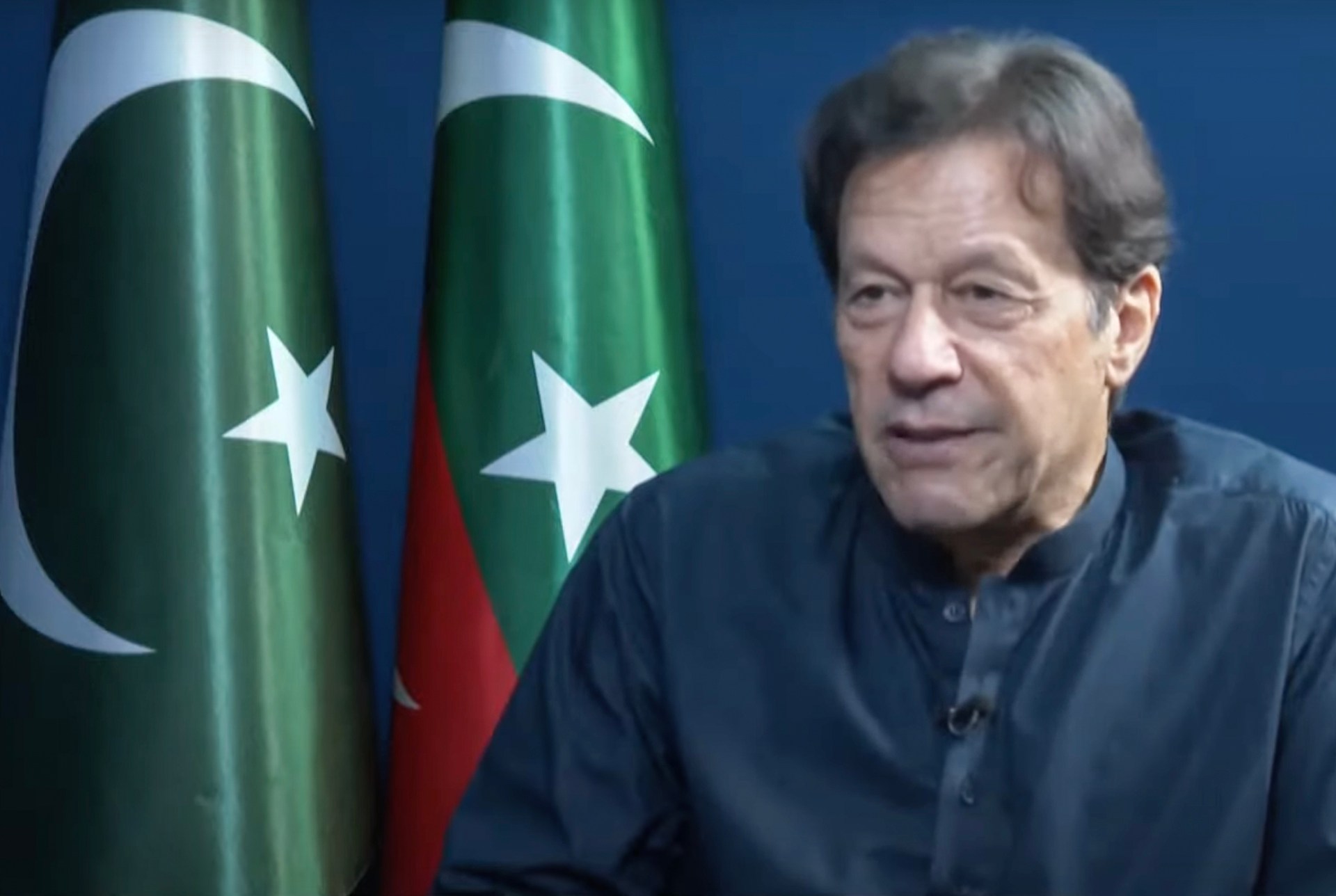World
Pakistan: Imran Khan says gov’t and army ‘want to crush PTI’

Former Pakistan Prime Minister Imran Khan has told Al Jazeera he does not “have a problem” with the country’s army chief but accused Chief of Army Staff (COAS) General Asim Munir of trying to stop him from returning to power.
“I have no problem with him, but he seems to have a problem with me,” Khan told Al Jazeera in an interview on Saturday days after the civilian government said it will use a controversial army law to try supporters of his Pakistan Tehreek-e-Insaf (PTI) party involved in damaging military installations.
“I haven’t done anything to antagonise the army chief, but there is something he has against me which I don’t know,” the former prime minister and head of the PTI party said.
The cricketer-turned-politician has accused Prime Minister Shehbaz Sharif of being “a puppet” of the powerful army, which has carried out multiple coups against civilian governments since the South Asian country’s independence in 1947.
The 70-year-old leader, speaking from his residence in the eastern city of Lahore, accused the police of arresting 7,500 protestors believed to be from his party. Khan urged his supporters to remain peaceful in case he is arrested, adding that the government will use instances of violence to launch a crackdown on the opposition activists and leaders.
“Entire top leadership [of the party] is arrested. You know, there are about 150 cases on me, so I could be arrested any time. But the point is, you cannot arrest an idea whose time has come,” Khan told Al Jazeera from his Zaman Park residence, where he has been holed up since May 13 after his release on bail.
Protests against his May 9 arrest sparked widespread unrest, with a mob of his alleged supporters storming the residence of a top military commander in Lahore and setting it on fire.
Call to end ‘arbitrary arrests’
Last week, the country’s civilian and military leaders said rioters and their backers who attacked Pakistan’s state assets and military installations during protests will be tried under army law.
The move has been condemned by rights organisations and activists, who argue that this risks violating civilians’ right to due process.
On Saturday, Human Rights Watch (HRW) condemned what it called “arbitrary arrests” of more than 4,000 people in the wake of the protests.
“The Pakistani authorities should end their arbitrary arrests of political opposition activists and peaceful protesters,” said HRW’s Associate Asia Director Patricia Gossman.
Pakistan: Mass Arrests Target Political Opposition https://t.co/vWbET6aRwq
— Human Rights Watch (@hrw) May 20, 2023
She urged that the “due process rights” of the detained be respected and that authorities display restraint and respect for human rights and the rule of law.
HRW underlined that Pakistani law requires all detainees to be brought before a court within 24 hours, which is consistent with the International Covenant on Civil and Political Rights, to which Pakistan is a party.
“Fundamental guarantees of peaceful protest and due process should not become casualties of Pakistan’s political conflict,” Gossman said.
‘Haven’t done anything to antagonise army chief’
Khan was ousted from power following a parliamentary vote of no-confidence last April, but he has accused the army of being behind his removal. His popularity has soared as the country has descended into its worst financial crisis in decades, with millions of Pakistanis facing food shortages.
Since his removal, Khan has organised dozens of mass rallies attracting tens of thousands of people and demanding snap general elections.
He reiterated his accusation that he was aware former Chief of Army Staff Qamar Javed Bajwa tried to oust him, adding that he could have used his power as prime minister to remove Bajwa from his position, but decided against it as he did not want to interfere with the army.
“[The] army is an institution you don’t interfere with…,” he said.
‘Government and establishment want to crush PTI’
The government has blamed Khan’s supporters for causing damage to military assets and has called him out for not condemning the violent protests that followed his arrest.
Khan was quick to defend himself, saying he was unaware of the violent protest while he was being held, and accused the police of killing 25 of his “unarmed supporters”.
“If I am jailed again, I don’t want violence [as] it feeds into the narrative of the PDM [Pakistan Democratic Movement],” he said, referring to the alliance of 12 political parties that launched the no-confidence vote against him last year.
“These parties are petrified of us, so they want to use violence to clamp down on us,” said the former PM, adding that the dozens of criminal cases filed against him and the arrest of his party’s top leadership are aimed at preventing him from contesting the upcoming general election.
“Every [opinion] survey says we will win the elections with a two-thirds majority, so the government and the establishment want to crush PTI,” Khan said.

World
US surgeon general urges cancer warnings for alcoholic drinks

World
Boy, 7, survives 5 days alone in African game park alongside lions, elephants

A missing 7-year-old boy survived five days alone in an African game park, alongside elephants and lions, in what Zimbabwean politicians are calling “a true miracle.”
Tinotenda Pudu spent nearly a week alone in Matusadonha game park after “wander[ing] away” and losing his sense of direction, Mutsa Murombedzi, a Member Parliment in Zimbabwe, wrote in a post on X.
Pudu was found by rangers from Matusadona Africa Parks after walking nearly 15 miles from home, according to officials.
Tinotenda Pudu, 7, was found safe after spending five days in the African jungle.
SAN DIEGO ZOO TO WELCOME PAIR OF GIANT PANDAS FROM CHAIN UNDER CONSERVATION PARTNERSHIP
“After [five] long, harrowing days in the jungle near Hogwe River, which feeds into Ume river, the boy has been found alive,” Murombedzi announced. “Sleeping on a rocky perch, amidst roaring lions, passing elephants, eating wild fruits and just the unforgiving wild [is] too much for a [7]-year-old.”

The boy survived for five days living amongst lions and elephants.
The park hosts lions, leopards, buffalo, zebras, elephants, hippos and antelope, according to African Parks’ website.
OUTSIDE OF CHINA, PANDAS ARE ONLY FOUND IN THESE 5 ZOOS AROUND THE WORLD
The Nyaminyami community beat night drums each day in hopes the boy would hear the sound and find his way back home, according to Murombedzi.

An African bush elephant is seen walking on a red dirt road in Pilanesberg National Park in South Africa. (Arterra/Marica van der Meer/Universal Images Group via Getty Images)
“Above all, we thank God for watching over Tinotenda and leading him back home safely,” she said. “This is a testament to the power of unity, hope, prayer and never giving up.”
Officials confirmed the child’s age to the BBC.
World
Q&A: Leader of Myanmar’s shadow government talks civil war strategy in 2025

This year is likely to be one of the most pivotal in Myanmar’s modern history.
The country is embroiled in a civil war, ignited by the military’s 2021 coup against an elected government.
Fighting has escalated and the military regime, which calls itself the State Administration Council (SAC), has suffered mounting defeats. It has responded to the loss of control over border regions and swaths of territory to opposition forces with indiscriminate air attacks and atrocities against civilians.
The military’s most formidable opposition – a coalition of ethnic armed groups – now controls most of Rakhine state in the country’s east and from the border with China to the city of Mandalay in the north.
Another major opposition force is the National Unity Government (NUG) – described as Myanmar’s shadow government – in exile, which oversees a loose collection of anti-regime groups known as the People’s Defence Force (PDF).
The NUG faces challenges in gaining diplomatic recognition on the international front and its fighters are struggling to capture urban areas on the home front.
Al Jazeera spoke with NUG Acting President Duwa Lashi La about the movement’s military and political strategy in 2025 and the war’s likely end game.
Al Jazeera: Please describe the NUG’s strategy for 2025.
Duwa Lashi La: In 2025, we would like to accelerate the wave of our revolution. Although it began with very little resources, the revolution has become stronger. In 2022, we formed armed forces. In 2023, we could launch military operations. In 2025, we are seeking the end game. The people of Myanmar have suffered too much for all these years. We have to bear all these atrocities, while the world just watches on.
In 2025, we are aiming for the complete elimination of evil [regime leader] Min Aung Hlaing from our soil.
Armed revolution is a vital focus, but it’s not the only one. It’s politically important to have inclusive participation of all the armed forces. It’s also very important to have strong diplomatic cooperation with the international community and to gain more support from them.
Another important factor is good communication with the public, and good governing in our controlled areas. We’re aiming to improve in all these areas in the new year. To achieve that, we have a strategic plan.
Al Jazeera: What do you think will happen in 2025?
Duwa Lashi La: We aim to reach a tipping point in 2025, a similar situation to Syria when al-Assad fled the country.
We have to strike a final blow against the SAC.
Parts of the international community, such as the ICC [International Criminal Court], are also attempting to prosecute Min Aung Hlaing. We completely support this. It would be great if the international community could arrest him. We’ll also continue our effort to prosecute him within our country from every way possible.
However, international intervention is essential in this transitional period.
With simultaneous and collaborative attempts between the international community and resistance forces against the SAC, we believe the SAC would be destroyed at once.
It’s very important to cut off the financial flow to the SAC to achieve this goal. The military is backed by strong resources that they have acquired from decades of controlling the country. We need to stop this.
The international community should also stop purchasing from Myanma Oil and Gas Enterprise, a huge financial source for the military. Additionally, the international community should stop providing jet fuel and selling weapons to the military.
I strongly urge the international community to stop communicating with the SAC, associating with them and recognizing them.
Al Jazeera: Does the NUG consider itself a leader of the nationwide revolution?
Duwa Lashi La: The NUG is at the frontline of the revolution, as the people of Myanmar elected us to lead it.
The international community needs to recognize this mandate.
Although certain ethnic resistance organizations (EROs) don’t exactly recognize the NUG as a central government, we are performing as one. We are also in consultation with various ethnic armed groups. Some EROs see the NUG as a common, central body that they support. So, our duty is to fulfil this role. That is why we cannot lose this revolution.
Al Jazeera: Recently you called for the return of NUG ministers to Myanmar – the public welcomed this call. Have any returned yet?
Duwa Lashi La: Our policy is that the revolution should not become stuck. There must be progressive changes within our movement. This is the time for NUG ministers to live with the people on the ground, share the struggle together, and feel the good and the bad of what people experience.
That is why I have urged ministers to return to the country. As this is an important issue, we have been discussing it within the ministerial committee, exclusively comprising all ministers, for about two months now. Certain plans have been laid down by the committee regarding this issue. Some ministers in the committee pledged to come to the frontline.
Al Jazeera: When will the NUG reshuffle its ministers? And who do you have in mind to take over what roles?
Duwa Lashi La: This is classified information. However, we have been as transparent as possible about this. The NUCC [a policy advisory body, the National Unity Consultative Council] has also already announced the NUG’s reformation.
We completely agree with the reforms. We don’t intend to occupy these roles permanently. It is also important for strengthening the NUG. We are always ready to welcome more skilful and capable individuals who would like to contribute to the revolution.
We have plans to reshuffle ministers to strengthen and speed up the revolution. But, as to when and what reshuffling, I won’t disclose at present. We have agreed on doing that in early 2025. There will be some changes in early 2025.

Al Jazeera: What are the NUG’s conditions for peace talks with the military?
Duwa Lashi La: The NUG is always open for dialogue. We never close the door on peace talks. The problem is that the SAC never wants to engage in political dialogue with us.
But we have one condition, as is outlined in our joint statement with the K3C [an ethnic armed group coalition]. If the SAC agrees to at least three of our six requirements, such as accepting civilian rule, and declaring to the world they will never interfere in the country’s politics, then we can move forward with the peace talks.
It’s important that the world’s superpowers, neighbouring countries and ASEAN countries [the Association of Southeast Asian Nations] must be included in witnessing and ensuring the military’s departure from politics. If they cannot agree on these grounds, it will be difficult for us to have peace talks with the SAC.

Al Jazeera: How are you trying to convince ethnic resistance organisations to back you, and why are some EROs reluctant?
Duwa Lashi La: We need to look back to history to understand that. Myanmar has often had situations where many ethnicities participated together in revolution. For example, when we rebelled against Japanese rule, it was the Kachin who started the revolution, and then the Chin also participated.
The Burmese and Buddhist groups sided with the Japanese, as they were also Buddhists. I don’t mean to discriminate against any communities here; I am just explaining the situation based on the facts.
We are seen as a Western-influenced group. But this revolution is completely different because everyone is involved in this struggle, as they should be. There are some levels of mistrust among the ethnic armed groups. For example, the KNU [Karen National Union] was alone in rebelling against military dictatorship.
Similarly, the Shan also started to rebel against the central government in 1959 and established an independent chain of command – the Kachin in 1961 and, later, the Chin. Everyone has been independently fighting against military dictatorship.
To systemize everyone under one chain of command, each having their own central body, has been the biggest challenge for the NUG. We need to work as a joint chain of command, where all chiefs of staff will have a joint commanding system.
As for now, we are working under a coordination system for joint military cooperation, and, as we have seen, it’s going successfully. But in the future federal military, we will have to establish one chain of command with the help of experts and concerned parties.
Al Jazeera: In June 2023, the NUG approved the replacement of the 1982 Citizenship Law that denies equal access to full citizenship rights for Rohingya and others in the country. Has the NUG officially repealed this law?
Duwa Lashi La: This has been under our consideration since 2021, just after the coup. We released a statement on the amendment of the unjust 1982 law. But when and how to do it depends on the legal requirements and the country’s situation.
When the situation improves, as we often say during the transitional period, when we are able to include the opinion of the grassroots level, when we get the people’s mandate, the concerned government will definitely amend that law.
It is not something we can rush. If we amend a law without deliberate consultation, it would be a weak law that would need to be amended again and again. We would not have the public’s trust in such weak laws. We must take time to create a law that the people have full faith and strong belief in.
Al Jazeera: How will you address increased Chinese backing for the military regime?
Duwa Lashi La: We are always attempting to make China understand the realities in Myanmar. Not only China – we would like our neighbouring countries, such as India and Bangladesh, to realize the real situation.
I cannot understand why they would support this brutal, heartless military that destroys its own country. China is our neighbouring country. We cannot choose our neighbour. We can’t say that we don’t like to be their neighbour and move Myanmar to an island. That’s impossible. Whether we like it or not, we always need communication with China.

But it’s important for our neighbours to know what the people of Myanmar want. One thing is clear: Myanmar must be in accordance with the will of the Myanmar people, as noted in the United Nations Security Council Resolution 2669. The people of Myanmar do not want a military dictatorship. Period.
To persuade them, we are communicating with China in every diplomatic way possible, through any channel possible. As we are neighbours, we ensure security and better collaboration in economics and their investments, as it’s a very economic-orientated country. We have informed them that any bilateral agreement between a democratic government of Myanmar and China would be ensured.
Al Jazeera: The military has been committing atrocities with its indiscriminate air strikes. What is the NUG’s counter to these air strikes?
Duwa Lashi La: We have always expressed our desperate need for antiaircraft weapons to counter military air strikes through various media channels. Ordinary weapons have been unable to take down the regime’s highly modernized Russian-made jet fighters.
We really need effective weapons, like antiaircraft missiles. But there are many limitations to obtaining such military weapons.
It’s possible if there’s a will – take Ukraine, for example. We are confident to take the whole military down within six months if we are provided with such weapons.
If we could ever get support like Ukraine, this struggle would end immediately.
At least 6,000 innocent people have lost their lives so far. Hundreds of thousands of civilian homes, religious buildings and schools have been destroyed, and these atrocities are mainly because of the air strikes.
Once again, I seriously urge the international community to consider the Myanmar situation and support the people’s revolution.
This interview has been edited for length and clarity.
-

 Business1 week ago
Business1 week agoOn a quest for global domination, Chinese EV makers are upending Thailand's auto industry
-

 Health6 days ago
Health6 days agoNew Year life lessons from country star: 'Never forget where you came from'
-
/cdn.vox-cdn.com/uploads/chorus_asset/file/24982514/Quest_3_dock.jpg)
/cdn.vox-cdn.com/uploads/chorus_asset/file/24982514/Quest_3_dock.jpg) Technology6 days ago
Technology6 days agoMeta’s ‘software update issue’ has been breaking Quest headsets for weeks
-

 Business3 days ago
Business3 days agoThese are the top 7 issues facing the struggling restaurant industry in 2025
-

 Politics1 week ago
Politics1 week ago'Politics is bad for business.' Why Disney's Bob Iger is trying to avoid hot buttons
-

 Culture3 days ago
Culture3 days agoThe 25 worst losses in college football history, including Baylor’s 2024 entry at Colorado
-

 News1 week ago
News1 week agoAmerican Airlines lifts ground stop that froze Christmas Eve travelers
-

 World1 week ago
World1 week agoWho is Europe's top investor in space in 2023?

















